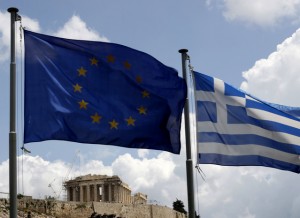 One of the keys to any successful negotiation is confident bidding. If you are assertive and look like you believe what you are saying then the other party may believe that you mean what you say. If you are anxious, hesitant or evasive then the other side won’t believe you and are likely to exert pressure on you to get more of what they want.
One of the keys to any successful negotiation is confident bidding. If you are assertive and look like you believe what you are saying then the other party may believe that you mean what you say. If you are anxious, hesitant or evasive then the other side won’t believe you and are likely to exert pressure on you to get more of what they want.
This is the story of the Euro crisis in a nutshell, and the latest vote in the German Parliament to endorse a rescue package will not alter this dynamic in anything other than the short term.
The financial markets do not believe that the Eurozone governments and the ECB are really willing or able to ensure that struggling economies like Greece will honour their huge sovereign debts. This is particularly so with regard to Greece. Market sentiment seems much less concerned with Ireland now, Spain and Portugal are seen to be making headway in solving their problems, and Italy is not seen as quite such a basket case.
The doubts about Greece are partly caused by prevarication within the Eurozone itself. Every time the Eurozone Governments avoid dealing with the issue or pass the buck to the ECB these concerns are intensified and market panic ensues. It is fine that the German Bunderstag has endorsed the expansion of the EFSF rescue fund available for buying debt bonds from Eurozone governments including Greece. However, other countries still have to endorse the package, so the markets remain sceptical of the outcome, and will continue to demand sky-high yields from government bonds in the meantime, or avoid buying them – both of which enhance the prospects of a default.
The same thing happens every time Greece is let off the hook in regard to its lacklustre pursuit of austerity policies. Greece has not been convincing in attempts to collect taxes, reduce public sector costs or reform its banking system. Yet it is still receiving further tranches of the 105 million Euro bailout fund offered in May by the Eurozone and IMF. Despite the visit of an auditing “Troika” last week to check on Greek compliance with its austerity targets, Greece knows that the Eurozone and the IMF cannot deny it funds at the moment without precipitating a debt crisis, and the Markets know that too, which causes market anxiety as to whether there is sufficient will to implement the measures required to avoid a default.
It is clear to the Markets that in reality there is going to be a default unless Germany writes a blank cheque to underwrite sovereign debt in Greece and other affected countries (which is politically impossible), so the Markets just don’t believe any half way house measures which are taken in the interim. In negotiating parlance these are “bids” that have no credibility.
So, the only thing that will bring this saga to a close is if “bids” by the Eurozone countries and the ECB are seen to be credible. If Germany will not underwrite all the debt at issue, and it is politically unthinkable for Greece to leave the Euro, then the only other alternative is to reduce Greek debt by way of an “orderly” default. For this to happen, the foreign banks that would suffer from such a default must be recapitalised so that they can withstand the shock. At that point there can be a reduction of Greek debt without causing turmoil in the markets. If Greek debt is reduced voluntarily by say, 50%, then it becomes much more plausible that it will ultimately be payable. Then the markets will start to believe that this is possible, and be more prepared to “accept” the proposals of Eurozone governments to bring this about…

